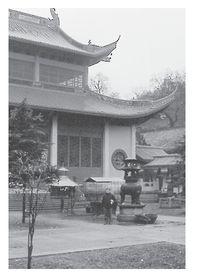Zen's Chinese Heritage: The Masters and Their Teachings (154 page)
Read Zen's Chinese Heritage: The Masters and Their Teachings Online
Authors: Andy Ferguson
Tags: #Religion, #Buddhism, #Zen, #Biography & Autobiography, #Religious, #Philosophy

Yuanwu said, “I said to Wuzu, ‘What is the meaning of the phrase, “It is words without words, a creeper held up by a tree”?’ Wuzu answered me by saying, ‘You can’t trace it. It can’t be drawn.’ I then asked him, ‘When the tree has fallen down and the creeper has withered, what then?’ Wuzu said, ‘See what comes next.’”
At these words Dahui was enlightened. He said, “I understand.”
Yuanwu then posed several probing questions at the student, and Dahui replied to each one without hesitation.
Finally Yuanwu said, “At last you know that I didn’t deceive you.”

Before long, Yuanwu shared his position of honor in the monastery with Dahui. Dahui’s reputation as a skilled teacher spread widely, and in the year 1126, when Dahui was only thirty-seven years old, the prime minister presented him with the ceremonial purple robe and the honorific title “Great Teacher Buddha Sun.”

In the year 1137, Dahui became abbot of the Nengren Temple.
236
One of Dahui’s students, a government official named Zhang Jiucheng, became enmeshed in a political struggle. His opponent, named Chin Gui, gained ascendancy and managed to execute Zhang. Dahui was caught up in the political fallout of this episode and was forced to flee with his monks to Hengyang. While there, he compiled the records of many ancient teachers along with a large number of kōans. The result was a six-volume collection entitled
The Treasury of the True Dharma Eye
.
In the year 1150, Dahui and his monks were forced by social unrest to move again, this time going as far as the southern city of Meizhou in Guangdong Province. There, plague and famine killed more than half of the more than one hundred monks in Dahui’s retinue.
By 1158, social conditions improved. Dahui was invited to move to Mt. Jing near Hangzhou and assume the abbacy there. In the years that followed, Dahui emphasized that the goal of all practice is the realization of enlightenment.
Dahui is known to have criticized “silent illumination Zen,” which held sway in the Caodong school. The chief proponent of this teaching was Zen master Hongzhi Zhengjue of Tiantong Temple. Despite this, many scholars today point out that mutual respect and cordial relations existed between Dahui and his supposed adversary. Hongzhi requested that Dahui take care of Hongzhi’s final affairs after his death.

Dahui entered the hall to address the monks. He raised and lowered his staff, then shouted and said, “Deshan’s stick. Linji’s shout. Today I present them to you. Heaven is so high. The earth is so vast. So don’t be just adding more shit on top of a shit pile. Get rid of your bones and wash out your guts! I’ll take three steps back and let you discuss this. Tell me how you will discuss it!”
Dahui then threw down the staff and shouted.
Then he said, “Add a little rouge and she’s a respectable girl. But if he has no money he’s not a proper suitor!”

Dahui entered the hall and said, “No sooner do we get past the midautumn festival, than it’s already the fifteenth day of the ninth month.”
He then propped up his staff and said, “It’s only this that doesn’t change.”
He then threw down his staff and said, “All of you! Listen and see!”

A monk asked, “When a single dharma arises, Vairochana Buddha becomes a commoner. When the ten thousand dharmas don’t exist, Samantabhadra loses his realm. Leaving aside these two paths, I ask the master to quickly speak.”
Dahui said, “Shedding its shell, the turtle flies up to heaven!”

A monk asked, “When mind and Buddha are both forgotten, then what?”
Dahui said, “In the hands of an old woman selling fans, the sun is revealed.”

Dahui entered the hall and addressed the monks, saying, “After continuous rain and no break in the clouds, suddenly heaven and earth open up and are clear. Then what use is it to still seek out the ways of the ancestors?”

In the year 1137, the emperor appointed Dahui Zonggao to be abbot of Shuangjing Monastery. One day, news arrived of the death of (Dahui’s teacher) Yuanwu Keqin. Dahui personally wrote a eulogy for his late master. That evening during a meeting with the monks, he recited the eulogy.

“A monk asked Changsha, ‘When Nanquan died, where did he go?’
“Changsha said, ‘In the East Village he’s a donkey. In the West Village, he’s a horse.’
“The monk said, ‘What does this mean?’
“Changsha said, ‘If you want to ride him you can ride him. If you want to get off him, you can do that too.’
“As for me, I don’t go along with this. If a monk asks me, ‘Where did the late master, Yuanwu Keqing, go when he died?’ I’d say to him, ‘He fell into the Avici Hell.’
“If the monk asked, ‘What does this mean?’ I’d say, ‘Eating molten copper. Drinking molten iron.’
“If the monk asked, ‘Is there anyone who can save him or not?’ I’d say, ‘No one can save him.’
“If he asked, ‘Why can’t he be saved?’ I’d say, ‘Because before he died, this was the same food the old fellow ate every day.’”
